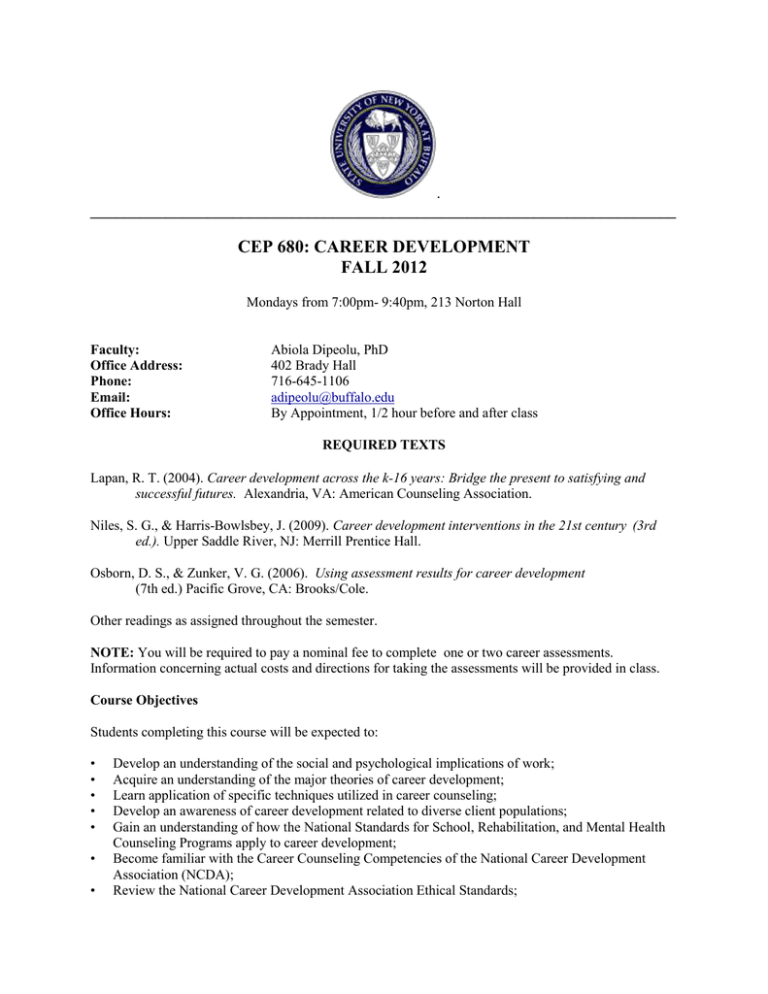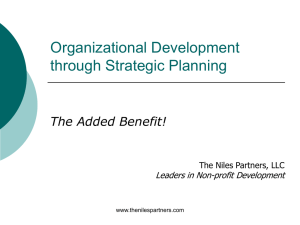File - Sarah M. Brothwell
advertisement

. ______________________________________________________________________ CEP 680: CAREER DEVELOPMENT FALL 2012 Mondays from 7:00pm- 9:40pm, 213 Norton Hall Faculty: Office Address: Phone: Email: Office Hours: Abiola Dipeolu, PhD 402 Brady Hall 716-645-1106 adipeolu@buffalo.edu By Appointment, 1/2 hour before and after class REQUIRED TEXTS Lapan, R. T. (2004). Career development across the k-16 years: Bridge the present to satisfying and successful futures. Alexandria, VA: American Counseling Association. Niles, S. G., & Harris-Bowlsbey, J. (2009). Career development interventions in the 21st century (3rd ed.). Upper Saddle River, NJ: Merrill Prentice Hall. Osborn, D. S., & Zunker, V. G. (2006). Using assessment results for career development (7th ed.) Pacific Grove, CA: Brooks/Cole. Other readings as assigned throughout the semester. NOTE: You will be required to pay a nominal fee to complete one or two career assessments. Information concerning actual costs and directions for taking the assessments will be provided in class. Course Objectives Students completing this course will be expected to: • • • • • • • Develop an understanding of the social and psychological implications of work; Acquire an understanding of the major theories of career development; Learn application of specific techniques utilized in career counseling; Develop an awareness of career development related to diverse client populations; Gain an understanding of how the National Standards for School, Rehabilitation, and Mental Health Counseling Programs apply to career development; Become familiar with the Career Counseling Competencies of the National Career Development Association (NCDA); Review the National Career Development Association Ethical Standards; CEP 680 Page 2 of 6 Dipeolu • • • • • • Become familiar with instruments utilized in career counseling; Be able to utilize career-related websites effectively; Develop an understanding of the decision-making process; Gain an awareness of career development as a life-long process. Develop an understanding of the social media as a powerful networking tool. Socialize into the career counseling profession through participation in the state career development association. Course Requirements 1. Attendance and Participation (5 points) Active participation is expected of everyone in this class, including involvement in simulated counseling and cooperative group learning experiences. It is also expected that each of you will come to class prepared to discuss pertinent topics and complete assigned readings. Points cannot be made up if a class is missed. 2. Most Growth Careers (10 points) Students will sign up to review a career identified as a growth career. You will need to use resources detailed in class (i.e., O*NET and the OOH) to find specific information related to that particular career, which you will then report to the class. You will need to take turn to share a summary of your findings on facebook, and then hand in a paper with the required information for grading purposes. Further guidelines will be provided in class. Due October 1st. 3. Website Review (10 points) Each student will review a career development website and be prepared to share information about the website with the class. Sign-ups for the websites will be handled in class early in the semester. You will be expected to write a brief summary, following guidelines provided. You will make copies available to your classmates for their professional portfolio. Please note: The website should be career development related, not college preparation sites such as financial aid. Due November 5th. 4. Career Development Tool: Social Media (10)? The use of social media has become part of the fabric of American society and culture, effectively changing people's experiences of work. Though it was established to help students keep in touch after graduation, but now social media effect goes beyond this benign usage. Specifically, facebook has created a boundaryless global society by transforming the private into the public and it’s also shaping the way people envision their careers. Thus, the use of social media is slowly becoming a powerful career development tool. As a result, we will be incorporating the use of, for instance, facebook into this class to further refine our usage for career development purposes. Toward this end, each student will be required to participate via NYSCDA facebook page by joining the organization. The annual dues for student membership is $25, expected to be paid by the second week of class. Students’ participation will be through assigned groups, which is based on program of study (i.e., school, rehab, and mental health counseling, etc.). By using the facebook platform, we will be learning the social etiquettes of using this medium, and how to be professional throughout our interactions. For instant, student will take turn to share the summary of information from the The most growth careers and The website review papers via the facebook platform before turning the final paper in. Discussion of what others think of the paper will immediately follow. Your CEP 680 Page 3 of 6 Dipeolu participation in the discussion will be a major part of your grade. Other activities to be completed via the facebook will be announced later in the semester. 5. Oral Presentation (Group Project) (15 points) Each student will be assigned to a group based on their program of study (i.e., school, rehab, and mental health counseling, etc.). Each group will be required to prepare an oral presentation for the class based on their experience using the social network site, i.e facebook. The presentation will involve sharing the positive part of the experience, plus the not so positive aspect of the experience, and how this could be improved in the future. You will be expected to use specific examples in your presentation, and share what could be added to target professionals from your assigned group. You will also be expected to answer the question, how do we use social media to help advance our professional goals, and help our clients/students do the same. This is expected to be a 20 minute presentation. Each group is expected to chose a theory and include how the theory will be affected by social media, use a rationale for your presentation based on current literature on the use of social media for career development purposes. Your classmates will complete an evaluation at the end of the presentation, which will be considered in the overall grading. All presentations will be made during the final two class sessions, depending on the number of groups. Due December 3rd. 6. Career Assessments (20 points) Throughout the semester, you will be reading about various career assessments in Osborn & Zunker (2006). This textbook will be the basis for the assessment project. a. In-Class Assessments (8 points): You will be expected to complete 2-4 in-class assessments. Please note that a number of these assessments are embedded in class activities. (September 24; October 1 & 15). b. Assessment Projects (12 points): You will select an appropriate instrument to use with a population of interest. You will be expected to provide a rationale for the chosen instrument. Guidelines will be provided to help complete the project and share the information with your classmates for their professional portfolio. Tentative Schedule Readings are listed for the concurrent sessions. You may also be asked to complete some additional readings pertinent to specific topics throughout the semester. Regardless of readings assigned, you will be expected to complete the readings from Niles & Harris-Bowlsbey, Lapan, and Osborn, et al., as assigned. Date Topic Readings/Discussions August 27 Introductions/Review of Syllabus and Course Req. Implications of the use of social media in the future of career development practice Social media: young professionals effect change in the workplace, K. Altes. Facebook finds its way into the workplace. J. Himmelspach Assignments Due CEP 680 Page 4 of 6 Dipeolu Date Topic Readings/Discussions September 3 Labor Day/No Class Social network site discussions on the implication of the rapid growth of social media in the future of career counseling practice. September 10 ASCA National Standards for School Counseling programs, National Career Development Association Competencies Introduction to Career Development Theories/History Niles & Harris-Bowlsbey: Chapter 1 & pp. 458-461 NCDA Competencies September 17 Person-Environment Fit/TraitFactor Theory Osborn & Zunker Chapter 3 Lapan Chapter 4 September 24 John Holland’s Theory Self Directed Search Niles & Harris-Bowlsbey: pp. 61-76 Osborn & Zunker Chapter 1 pp.78-82,94-100 In Class Assessment (1st in-class assessment) Most Growth Careers (2nd in-class assessment) October 1 Krumboltz’s Theory ASVAB Niles & Harris-Bowlsbey pp. 7280. Supplemental Reading: TBA October 8 Quiz 1 Niles & Harris-Bowlsbey pp.8597 Negative Career Thoughts and young adults with learning disabilities. Dipeolu & Keating. Negative career thoughts through adulthood. Dahl, Austin & Wagner. Cognitive Information Processing Theory/Social Cognitive Theory Assignments Due October 15 Brown’s Value Based Theory ASVAB Presentation Niles & Harris-Bowlsbey pp.97101 Osborn & Zunker Chapter 8 October 22 Super’s Life Span/Life Space Theory Niles & Harris-Bowlsbey pp. 4056 (3rd in-class assessment) CEP 680 Page 5 of 6 Dipeolu Date October 29 Topic Computer Assisted Career Guidance November 5 Career Decision Making ACCESS Presentation November 12 Quiz 2 Career Development & Diverse Populations VESID Presentation November 19 November 21-24 November 26 December 3 December 10-17 Career Development Inventories Readings/Discussions Assignments Due Niles & Harris-Bowlsbey Chapter 7 Osborn & Zunker Chapter 11 Teaching career development Professionals to work with people with disabilities. Dipeolu. Website Review Niles & Harris-Bowlsbey Chapter 4 Osborn & Zunker Chapter 12 Niles & Harris-Bowlsbey Chapter 11 Osborn & Zunker Chapter 9 Dr. Dipeolu’s article In Class Assessment (4th in-class assessment) Fall Recess (Thanksgiving) Ethical Issues in Career Niles & Harris-Bowlsbey Counseling Assessments: Non- Chapter 14 standardized NCDA Ethical Standards: pp.446-451 Osborn & Zunker Chapter 13 Assessment Project Presentations Wrap Up Final Examinations 7. Two Quizzes (30 points) There will be two quizzes throughout the semester. Each quiz will be worth 15 points (although there may be more than 15 items). See syllabus for dates. 8. Grading Scale and Requirements All papers are to be completed using the fifth/sixth edition APA writing style. CEP 680 Page 6 of 6 Dipeolu Assignments are due at the start of class on the designated date. If handed in late or within one/two days late, there will be a 10% deduction on the score. If handed in between three and six days late, there will be a 20% deduction. If you have extenuating circumstances, please talk with the instructor ahead of the due date or as soon as possible thereafter in case of emergencies. Grades will be based on the following scale: 90 - 100= A 80 - 89 = B 70 - 79 = C 60 - 69 = D Less than 60 = F 9. Academic Integrity All students are expected to uphold the Academic integrity policies and procedures of the University at Buffalo. Cheating, plagiarism, and other acts of academic dishonesty will not be tolerated. 10. Special Needs/Accommodations Any student who has special need for assistance (i.e. learning disability, physical disability, etc.) which could influence a student’s ability to carry out course requirements or requiring accommodations needs should advise the instructor of the specified needs during the first two weeks of class. Guidelines as established by the Office of Disability Services will be followed.





